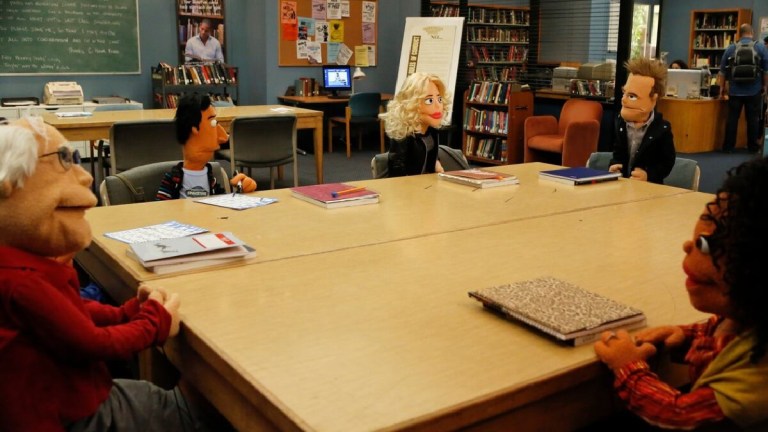Was Community’s “Gas Leak” Season Really That Bad?
Community season 4 faced an uphill battle without its "captain" Dan Harmon. Is there redemption to be found for it 10 years later?

On Feb. 7, 2013, after delays and significant drama behind the scenes, Community debuted “History 101,” the first episode of the long-awaited fourth season, and the first under new showrunners David Guarascio and Moses Port. Fan reaction to the outing was mixed, to put it mildly, while critics were downright savage. Soon enough, cast and crew began to express their misgivings, too. The entire season was later written off in-universe as the result of a gas leak, never to be spoken of again.
Was that a fair assessment, though? Countless other “bad” installments of pop culture have been revisited over the years, only for perceived faults to be found not quite so damning as audiences initially thought. With an entire decade of hindsight and objectivity to reflect upon, was the fourth season of Community really that bad?
Kind of, yeah!
There is, quite simply, something off about the entire season. Guarascio and Port’s version of Community is a funhouse-mirror rendering, where things aren’t strictly wrong, but they sure as hell aren’t right, either. Actors Joel McHale and Jim Rash, speaking to The New York Times, pinned that surreality squarely on the departure of creator Dan Harmon, likening the season to a ship without a captain.
Harmon, the driving force behind Community for better and worse, was fired by Sony at the end of season three after years of contentious behavior. And while putting the onus of the show’s entire well-being on one man’s shoulders does a disservice to the rest of the crew – nevermind Harmon’s already overburdened ego – his departure nonetheless created waves that Guarascio and Port weren’t able to navigate.
Producers and writers Neil Goldman, Garrett Donovan, Chris McKenna, and Dino Stamatopoulos left the show in solidarity with Harmon. The Russo Brothers, producers and frequent directors, were stolen away by Marvel. Meanwhile, those that remained – most notably director Tristram Shapeero and writers Andy Bobrow and Megan Ganz – found themselves without a bulwark against Sony.
Look at “Intro to Knots.” The Christmas episode was meant as an homage to Hitchcock’s Rope, including the use of minimal one-shot takes, but, per Bobrow, he and Shapeero acquiesced almost immediately to studio demands to make the episode more traditional. Something Bobrow is confident Harmon never would have done.
And then, of course, there was the Chevy Chase of it all. His character, Pierce, despite some growth in previous seasons, became explicitly racist in ways that are uncomfortable to watch. In ways even Chase, difficult on a good day, felt went too far. He pushed back against this new direction, before, ultimately, crossing the very same line he was arguing against and leaving the show in disgrace. In the meantime, he took out his growing anger on the cast. The Thanksgiving episode shows a rage that, quite frankly, Chase isn’t skilled enough to fake.
With this much turmoil behind-the-scenes, it’s little wonder that what did finally air was, well, less than stellar.
The once-vaunted innovation and homages that made Community a cult-favorite became empty gimmicks. The premiere includes a Hunger Games spoof that has nothing to do with The Hunger Games, and is, in fact, something more akin to American Gladiator. Later, the German foosball players reappear. The normally reliable Chris Diamantopoulos replaces Nick Kroll, speaking in a strange Marvin the Martian-styled accent. The Germans are now, instead of the hyper-specific bar-sport kings of season three’s “Foosball and Nocturnal Vigilantism,” the broadest of villains. The MacGuffin Institute of “Advanced Documentary Filmmaking” mistakes blatant gags for winking meta-ness.
Recurring side characters like Neil (Charley Koontz) and Garrett (Erik Charles Nielsen) are relegated to background extras, literally showing up without lines. Chang (Ken Jeong) wanders around with “Changnesia,” seemingly in another show entirely.
Worse still, season four forgets who the main characters are, too. Jeff (McHale) comes out of the gate as “New Jeff,” abruptly different and given no follow-through on this trajectory. He and Annie (Alison Brie) are the closest to a couple they’ve ever been, despite the twenty-year age difference previous seasons made a point to explain was gross and morally questionable.
Similarly, the final song of the hot-air balloon episode, “Intro to Felt Surrogacy,” has the characters revealing “dark secrets” that, in Shirley (Yvette Nicole Brown) and Annie’s cases specifically, run entirely opposite to everything we know about them. Even in Shirley’s worst moments, she would never forget her children overnight. Annie would never succumb to a lecherous professor’s foot fetish.
Lines and quips from Community’s greatest hits are repeated frequently – presumably, to prove that this is the same show – but in ways that don’t feel organic, and, worse, miss the point entirely.
In season three’s “Digital Exploration of Interior Design,” Britta (Gillian Jacobs), tasked with seducing the human embodiment of the Subway sandwich chain, pushes back, saying, “I am not a whore, and not that I’ve done the math, but if I were, I’d be the super classy kind who gets flown to Dubai to stay in an underwater hotel.”
That line is revisited in season four’s “Economics of Marine Biology,” this time with Britta stating that she should have run off to Dubai with the man who propositioned her. A joke made literal, and in a way that feels entirely false: Britta would never be an escort, that’s the point, not that she turned down an opportunity.
And that is, perhaps, the biggest sin of season four: the cynical heart of Community was replaced with an abject mean-spiritedness. Comedy was put before character, damaging both in the process.
That said, there are some highlights, with “Basic Human Anatomy” (written by Jim Rash), “Herstory of Dance,” and the Physical Education Education subplot in the otherwise awful “Economics of Marine Biology” at the fore. And, of course, Brie Larson as Rachel, a casting coup that even Dan Harmon couldn’t find fault with.
Despite these moments, season four of Community remains a low point for the show, a rough draft of fan fiction that could’ve used another pass. For once, audiences got it right the first time: the “gas leak” year deserves to be ignored.
All six seasons of Community are available to stream on Netflix.
